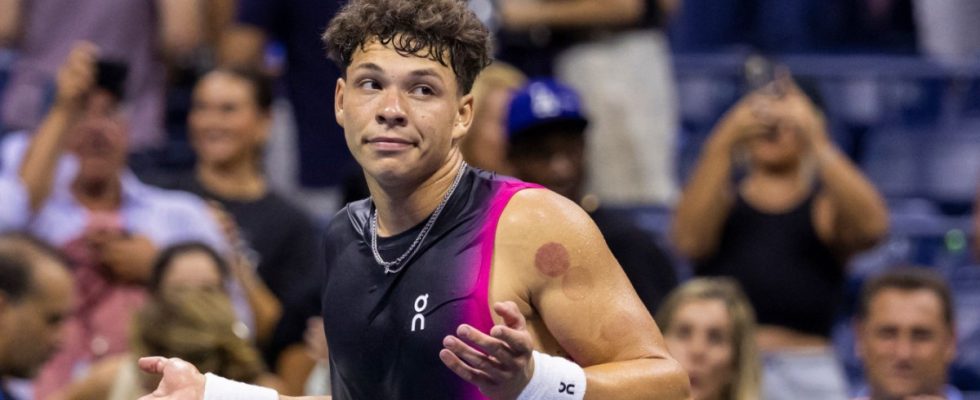When it was all over and people were really celebrating the two participants in this special US Open game, Ben Shelton looked briefly at his father Bryce in the box. For a brief moment he didn’t seem self-confident, but insecure, incredulous: Are they cheering because of me? Do I really deserve this? Is this really happening right now?
Yes, it actually happened. Shelton had defeated his American compatriot Frances Tiafoe 6: 2, 3: 6, 7: 6 (7), 6: 2 in the quarterfinals of the US Open, he had earned the deafening noise. And at just 20 years old, he had to endure everything that the Americans can charge a tennis game with at their home Grand Slam, which should not only deliver gripping games, but thrilling stories. At best, about Americans.
This game didn’t draw its fascination from tactical finesse, it wasn’t a treat either. It was more like a bar fight, with two rabid ones swinging wildly in hopes of somehow getting more hits than the other. And she drew her excitement from what Tiafoe had described earlier: “Two Americans, two afro-American; at the stadium named after Arthur Ashe. This is a big night for people of color.”
55 years ago Ashe won the US Open, he is still the only black man to do so. No, no gender error at this point, women of color have already done this more than once: Althea Gibson in 1957, for example, and the Williams sisters a total of eight times. The 2018 final between Naomi Osaka and Serena was also a final between two people of color.
So now Shelton against Tiafoe, and in the end the one who scored more often really won: 150 of the 230 rallies were decided by a winner or a slight error. They were almost even on penalties (Shelton made one more: 34), but Shelton managed 50 winning strokes versus Tiafoe’s 33, and he celebrated each one with gestures from a rich store of happy moves.
Shelton also poses like a professional catcher
Think of Shelton on the pitch as a commentator radically honest about what he’s thinking about Ben Shelton. After the first sentence, he barked to his companions: “God, I’m really slow.” After a soulful cross pass: “Ooooooh, that was good!” But also, after a completely unsuccessful stop: “Heieeii, that was unnecessary!” Or when his father Bryce, once a tennis pro and now the Filius’ trainer, told him from the box that he should go to the net a little more often, Shelton actually did that and after a sugar stop pointed to his dad and said: There you were right – good tip!
So he takes the audience into his head, and there’s something authentic about him posing like a pro catcher or patting his biceps after a great rally. It’s something completely different when someone is honestly happy and carries the audience away than when someone encourages people to make a little noise like so many professionals do at the US Open. A cheer is like a nickname: should never be demanded, it must be earned.
The US Open chapter ends for Frances Tiafoe this year in the quarterfinals.
(Photo: Eduardo Munoz Alvarez/dpa)
Tiafoe earned both with his incredible run last year, storming into the semifinals by beating Rafael Nadal and telling the rising star story they love so much in this country: poor boy whose father worked at a tennis academy who started the sport tried and wanted to secure a scholarship at a university. On his bracelet “Why not me?” stood, a message in itself – but also to others, as he said: “If just a black, underprivileged child plays tennis because of me, I have achieved something.”
That was a year ago. Now Shelton tells the new story, that was clearly heard that night at Arthur Ashe Stadium: nobody wanted to see Tiafoe lose, of course, but a lot of people wanted Shelton to win. The story of Shelton: Mega talent from the upper middle class, star in the US college system – who had not left the USA before the Australian Open this year, where he reached the quarterfinals. A rascal who likes to grin and fool around; one that they would probably find too excited and too optimistic in Germany, but they love it in the USA: cockyi.e. self-confident bordering on arrogance.
Shelton calls it “good vibes” when he celebrates great shots like the return to the set ball defense in the third round with a Michael Jordan shrug. Or his success when he, who actually still had a landline phone at his parents’ house in Atlanta as a child, put his hand on the receiver and put it on the cradle as a sign: no more connection at this number. He also calls the relationship with his father “good vibes” – who told him before the match ball: “Watch out, there’s a good return coming, be ready.” There was a good return, Shelton was ready. So: Call the father with a show of hands, hang up, that’s it. “He always gives me what I need,” he said afterwards: “It can be tactical advice or positive energy.”
No line on this number: Ben Shelton.
(Photo: Mike Segar/Reuters)
Now he’s the youngest American in the US Open semifinals since Michael Chang in 1992, and he’s meeting someone who, according to Shelton, “has already won 23 of these things”. Novak Djokovic is the opponent and he is suspected to have lost the first two sets against Laslo Djere in the third round – winning all the other games straight – just to see how that feels, 0-2 to lie behind.
“Hey guys,” Shelton called out to spectators walking from Arthur Ashe Stadium to the Arthur Ashe statue, “Maybe you guys can stop by on Friday and cheer me on a bit.” Their reaction: They will be there, and in large numbers.

